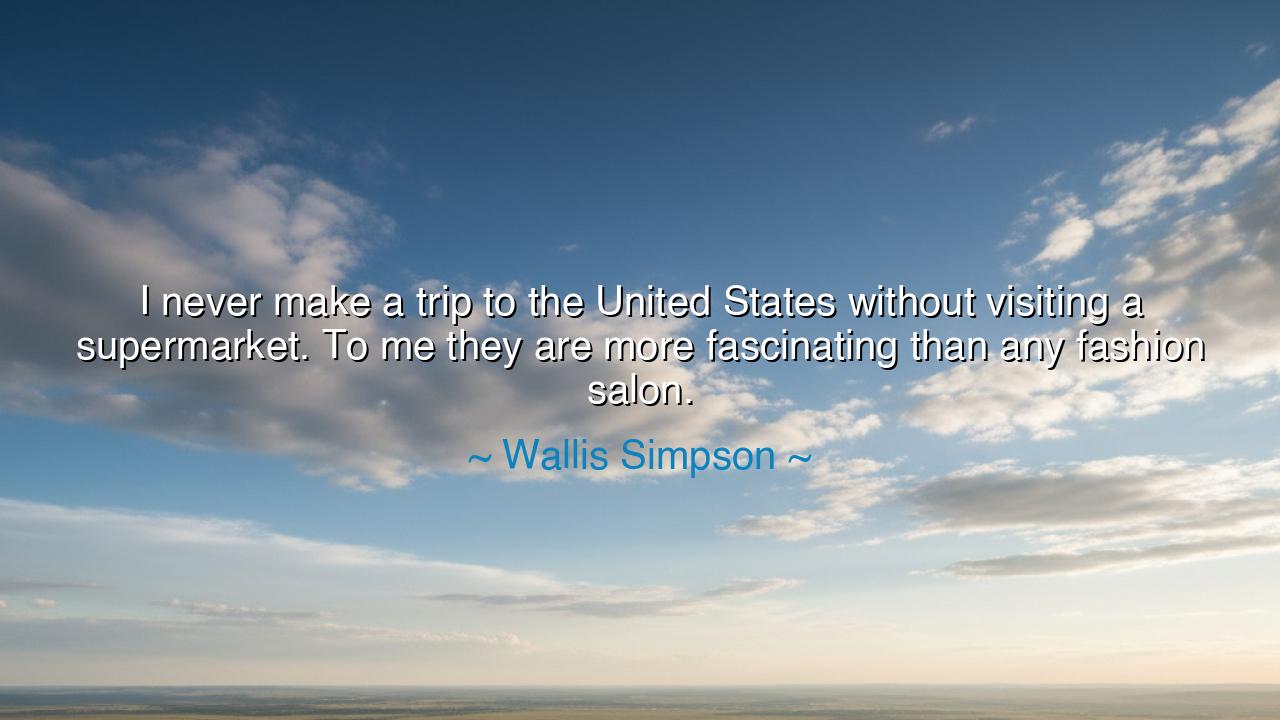
I never make a trip to the United States without visiting a
I never make a trip to the United States without visiting a supermarket. To me they are more fascinating than any fashion salon.






Hear, O seeker of truth in the ordinary, the words of Wallis Simpson, who once declared: “I never make a trip to the United States without visiting a supermarket. To me they are more fascinating than any fashion salon.” To many, these words may seem light, even humorous, for what could compare to the glamour of gowns and jewels? Yet hidden within them lies a lesson profound: that wonder is not confined to gilded halls, but is found also in the common spaces where life is sustained. The supermarket, filled with food from the earth and goods of daily labor, becomes, for the discerning eye, a cathedral of civilization.
For behold, in the supermarket is gathered the toil of many lands—the farmer’s grain, the fisherman’s catch, the vintner’s wine, the baker’s loaf. Under one roof are assembled the fruits of nature and the triumphs of human craft. To Wallis, who walked among princes and courtiers, it was not the shimmering mirrors of the fashion salon that most amazed her, but the abundance of the humble store. She saw, perhaps, that while silks clothe the body in splendor, bread and fruit clothe the spirit in sustenance.
The ancients knew this truth well. When Solon of Athens traveled to foreign lands, he marveled not only at the palaces of kings but also at the markets of common men, where exchange and fellowship took place. There he saw the heartbeat of the people, their desires, their customs, their life. To understand a nation, one must walk not only in its temples, but also in its markets. So too did Wallis perceive that the supermarket, more than the salon, revealed the soul of America—the vastness of its land, the ingenuity of its people, and the abundance that crowned their tables.
Consider also the story of Peter the Great of Russia, who traveled through Europe not in royal finery but disguised as a common laborer. He studied shipyards, workshops, and marketplaces, and from them he learned how to transform his nation. Had he remained in the salons of aristocracy, he might have gained only surface knowledge. But by walking among the bread, the wood, and the iron, he drew wisdom from the foundations of life itself. Wallis’s delight in the supermarket echoes this same truth: to see the essence of a people, look not to their luxuries, but to their necessities.
There is also in her words a challenge to our vision. Too often we pass through aisles of food, shelves of goods, and baskets of fruit without awe, taking them for granted. Yet imagine the miracle: foods from across oceans, fruits once reserved for kings, spices once weighed in gold, all resting within arm’s reach of the common buyer. The supermarket is a tapestry of earth’s bounty and human endeavor, a living testament to how far civilization has come from the hunger and scarcity of the past. To despise it in favor of the salon is blindness; to cherish it is wisdom.
O listener, take this lesson to heart: seek wonder not only in the extraordinary, but in the ordinary. Do not measure worth only by glamour, but by the power to nourish life. A gown dazzles for a season, but a loaf of bread sustains for a lifetime. The wise traveler finds marvels in both, but never forgets which is more essential.
Practical action follows: when you travel, do not confine yourself to monuments and luxuries. Visit the marketplaces, the grocery aisles, the fields, and the kitchens of the people. See what they eat, how they live, what sustains them. In this way, you will not only admire their beauty but understand their soul. For, as Wallis Simpson teaches, the greatest revelations of a nation may not lie in its salons, but in its supermarkets.
Thus I say to you: cherish the ordinary, for in it the extraordinary is concealed. Learn to marvel at what sustains life, and you will carry a deeper wisdom than the one who admires only what glitters. For the true wealth of a land is not in its fashion, but in its food, its people, and its abundance.






AAdministratorAdministrator
Welcome, honored guests. Please leave a comment, we will respond soon